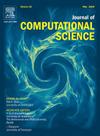A fast temporal second-order compact finite difference method for two-dimensional parabolic integro-differential equations with weakly singular kernel
IF 3.1
3区 计算机科学
Q2 COMPUTER SCIENCE, INTERDISCIPLINARY APPLICATIONS
引用次数: 0
Abstract
We propose a fast temporal second-order compact finite difference method for solving a class of two-dimensional parabolic integro-differential equations with weakly singular kernel. The sum-of-exponentials approximation of the kernel function is combined with the product averaged integration rule to approximate the weakly singular integral term, and the fourth-order compact finite difference method is employed to discretize the spatial derivative operator. We use the discrete energy technique to rigorously prove that the proposed fast method is almost unconditionally stable and convergent. Compared with the direct method, the fast method significantly reduces storage and computational costs while maintaining the temporal second-order convergence and spatial fourth-order convergence for weakly singular solutions. Some comparisons with the fast method using the exponential-sum-approximation technique, the fast Runge–Kutta convolution quadrature method and the explicit fast method based on the sum-of-exponentials approximation are discussed. The numerical results confirm the results of theoretical analysis and demonstrate the computational efficiency of the fast method.
求助全文
约1分钟内获得全文
求助全文
来源期刊

Journal of Computational Science
COMPUTER SCIENCE, INTERDISCIPLINARY APPLICATIONS-COMPUTER SCIENCE, THEORY & METHODS
CiteScore
5.50
自引率
3.00%
发文量
227
审稿时长
41 days
期刊介绍:
Computational Science is a rapidly growing multi- and interdisciplinary field that uses advanced computing and data analysis to understand and solve complex problems. It has reached a level of predictive capability that now firmly complements the traditional pillars of experimentation and theory.
The recent advances in experimental techniques such as detectors, on-line sensor networks and high-resolution imaging techniques, have opened up new windows into physical and biological processes at many levels of detail. The resulting data explosion allows for detailed data driven modeling and simulation.
This new discipline in science combines computational thinking, modern computational methods, devices and collateral technologies to address problems far beyond the scope of traditional numerical methods.
Computational science typically unifies three distinct elements:
• Modeling, Algorithms and Simulations (e.g. numerical and non-numerical, discrete and continuous);
• Software developed to solve science (e.g., biological, physical, and social), engineering, medicine, and humanities problems;
• Computer and information science that develops and optimizes the advanced system hardware, software, networking, and data management components (e.g. problem solving environments).
 求助内容:
求助内容: 应助结果提醒方式:
应助结果提醒方式:


